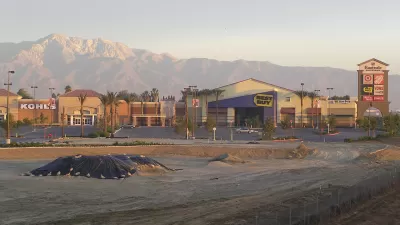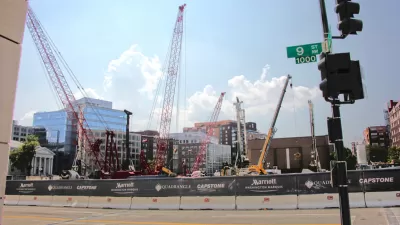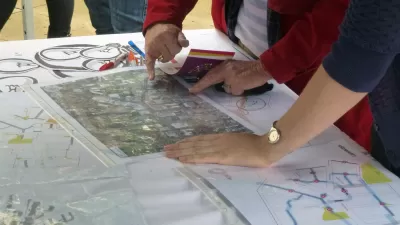Development

Chicago TOD Strategies: Sum Of Parts Equal, Greater Than the Whole
A successful TOD will be predicated upon three core elements: 1) development; 2) transit; and 3) transit-friendly amenities. While focus tends to be on the first two elements, this article provides insights on the importance of the third element.

The 11 Most Endangered Places in the U.S.
These historic sites—be they buildings, districts, or natural landscapes—are closer to destruction than any others in the United States.

Los Angeles' Neighborhood Integrity Initiative Presents Demands to City Leaders
Last week, leaders of the initiative to curb development in L.A. surprisingly presented Mayor Eric Garcetti with an ultimatum: Agree to their list of demands by August 24, or they will take the issue to the March 2017 ballot.

Counting the Indicators of a Deflating California Real Estate Bubble
Canceled projects, price discounts, and increased incentives to buyers are already showing up in real estate developments in key U.S. regions, writes estate and affordable housing adviser Michael P. Russell. He reviews some key indicators.

Bringing By-Right Affordable Housing to California
Reviewing Governor Jerry Brown's recent proposed legislation to permit projects that provide affordable housing to be approved as-of-right.

The Role of Planning in Fixing Los Angeles' Development Woes
Globe St. featured an exclusive interview with Gail Goldberg, executive director of the Urban Land Institute, Los Angeles Chapter, and former planning director of Los Angeles and San Diego.
City Hall 'Outsider' on Opening Up L.A.'s Development Process
Los Angeles is experiencing an elevated anti-growth conversation and suspicion of insider dealings at City Hall. In the midst of this, a councilmember known as an "outsider" aims to reconcile his constituents with the city's development processes.
Seattle Releases App to Track Development
Into an active development environment, and the resulting heightened pitch of development controversies, comes a new app from the city of Seattle that allows the public to track development projects.

San Francisco's Proposed Housing Moratorium Is a Bad Idea
After San Francisco Supervisors reject housing moratorium, proponents vow ballot initiative. But a moratorium is the wrong solution to the problem and would likely lead to continued price increases, condo conversions, and Ellis Act evictions.
Would Building in Hot Markets Help Housing Affordability?
As people move back into the cities, and rental housing demand goes up, it's been an interesting time for people wrestling with the problems of highly unaffordable areas to live.

Places for Parking, Not People, in Santa Monica, California
After noting the heated rhetoric that surrounds development in Santa Monica, especially during election season, Jason Islas reveals claims of the city's overdevelopment to be true—if we're talking about cars.

Is Urban Revitalization Possible Without Displacement and Gentrification?
Jared Green asks the billion dollar question for economic developers and planning agencies throughout the United States: is urban revitalization of neighborhoods possible without the subsequent gentrification and displacement of current residents?

How Planners Can Help Cities Thrive
For planners, the key to moving a city’s vision for development forward is to value public as well as private investment in projects, according to urban planner and author Howard M. Blackson III.
Developer Pins Los Angeles' Infrastructure Problems on Bureaucratic Bloat
According to developer and consultant Michael P. Russell, the city of Los Angeles has a chronic shortage of funds for infrastructure due to a bloated bureaucracy, small district city council elections, and term limits.
Examining Commercial and Mixed Use Development Trends in the Rocky Mountain West
Market trends have changed in recent years, but how exactly are they changing? A newly published report examines the commercial and mixed use market landscape in the rocky mountain west, and suggests how to properly capitalize on evolving trends.

Self-Starter Urbanism: Small Firms Tackle Big Projects on Their Own Terms
Development and research projects allow small firms entry into large-scale design.

Anatomy of a NIMBYcide in Santa Monica
A look at how the previous approval of the Hines Bergamont Transit Village project was rescinded after pressure from community activists, by real estate developer and consultant Michael Russell.
Questioning Chicago’s Development-Friendly Reputation
Chicago has a reputation for being the most development-friendly city this side of Houston. But Stephen J. Smith cites restrictive zoning outside the Loop as one cause of the city’s anemic housing market.
Moving the Hollywood Fault to Suit Developers
Morris Newman sees the lighter side of complaints over a new state geology map that puts an earthquake fault under some big real estate plans.
How Public Surveys Aid the Planning Process
When planners are looking to find out what kind of developments residents like, one way is to ask them to weigh in. Planner Clement Lau shares key lessons learned about conducting and creating surveys as part of the planning process.
Pagination
Urban Design for Planners 1: Software Tools
This six-course series explores essential urban design concepts using open source software and equips planners with the tools they need to participate fully in the urban design process.
Planning for Universal Design
Learn the tools for implementing Universal Design in planning regulations.
Caltrans
Smith Gee Studio
Institute for Housing and Urban Development Studies (IHS)
City of Grandview
Harvard GSD Executive Education
Toledo-Lucas County Plan Commissions
Salt Lake City
NYU Wagner Graduate School of Public Service


































